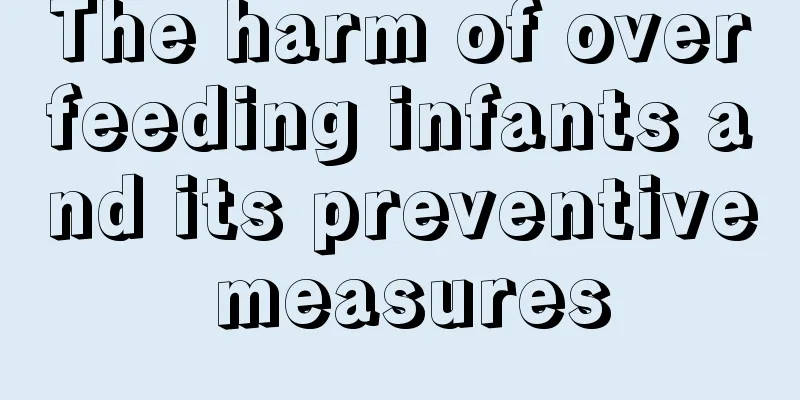The harm of overfeeding infants and its preventive measures

|
In traditional concepts, overfeeding refers to a syndrome characterized by indigestion caused by "excessive intake of breast milk" in infants. Overfeeding, which is often mentioned now, mainly refers to the energy and related nutrients given exceeding the body's needs to maintain metabolic homeostasis, resulting in overweight or obesity in infants. Now let’s take a look at the dangers of overfeeding babies and how to regulate it. 1. The harm of overfeeding The stomach capacity of a newborn baby is only the size of a pea. If the baby is allowed to consume too much breast milk at once, the baby's hunger center will work prematurely, the stomach will be too large, and the contraction after emptying will be very uncomfortable. The child will definitely cry violently, and the adults will continue to feed him breast milk when they see the child crying, and the vicious cycle will become more and more serious. The clinical manifestations of overfeeding in infants are: (1) stools that are often foamy and green in color. ⑵ Vomiting and spitting up cannot be relieved by burping. ⑶ Abdominal pain, accompanied by crying due to abdominal pain or bloating. ⑷ No weight gain or weight loss. 2. How to prevent overfeeding 1. Strengthen nutrition education Nowadays, many new parents lack nutritional knowledge and follow the parenting experience of the older generation that "the fatter the child, the healthier". This leads to the premature addition of complementary foods and premature weaning. The premature addition of weaning foods and high-salt, high-protein intake are the main causes of overfeeding. Strengthen nutrition education so that all mothers who are or will be breastfeeding understand the importance of proper feeding, increase breastfeeding rates, prepare formula milk correctly, and delay the time when infants are introduced to solid food. The incidence of overweight and obesity in children will drop significantly. 2. Establish good eating habits and lifestyle A strict diet and a good lifestyle are the most effective ways to prevent overweight and obesity in infancy. During the critical period of forming eating habits, efforts should be made to avoid bottle-feeding for too long, and to avoid using food as a means of comfort and encouragement. Also, efforts should be made to avoid encouraging sweets, fried foods, and special preferences for certain foods. When it comes to feeding babies, every family has its own parenting guide, but scientific and reasonable feeding conflicts with traditional experience. However, in order to avoid overfeeding, allow the baby to grow up healthily, and strengthen nutritional knowledge, this is a very important course that parents must learn. |
<<: Why do babies have difficulty breathing?
>>: Why is my four-year-old baby coughing?
Recommend
What happens if a newborn baby hasn’t pooped for ten days?
It goes without saying that a baby who has not ha...
Newborn baby routine
Many parents think that newborns only need to eat...
What to do if your child doesn't sleep on his own
There are many reasons why children don’t like to...
What is the best way to treat children’s stuttering?
Children are the fruit of love and the future of ...
Chalazion in children
Chalazion in children is a disease that occurs in...
What to do if your baby has a persistent low-grade fever
If the baby has a low-grade fever that won't ...
What Chinese medicine should babies take when they have internal heat?
The baby's immunity is relatively weak, espec...
How to eat chicken liver for babies?
During the development and growth stage, babies s...
Inflammation of the left upper lobe of the lung in children
It is relatively common for children to get pneum...
What to do if your child wets the bed every day
There are many children who wet the bed every day...
What should we pay attention to when we have acute rash in children?
Roseola infantum occurs frequently, but not all p...
What is the head circumference of a 2-year-old baby?
The healthy growth of the baby is very important ...
Baby's stool has mucus
As a group that cannot speak or think, babies hav...
Can children take anti-inflammatory drugs for toothache?
Toothache is a relatively common phenomenon. Not ...
Breastfed baby's stool is yellow with green
For many parents, it is actually very difficult t...









